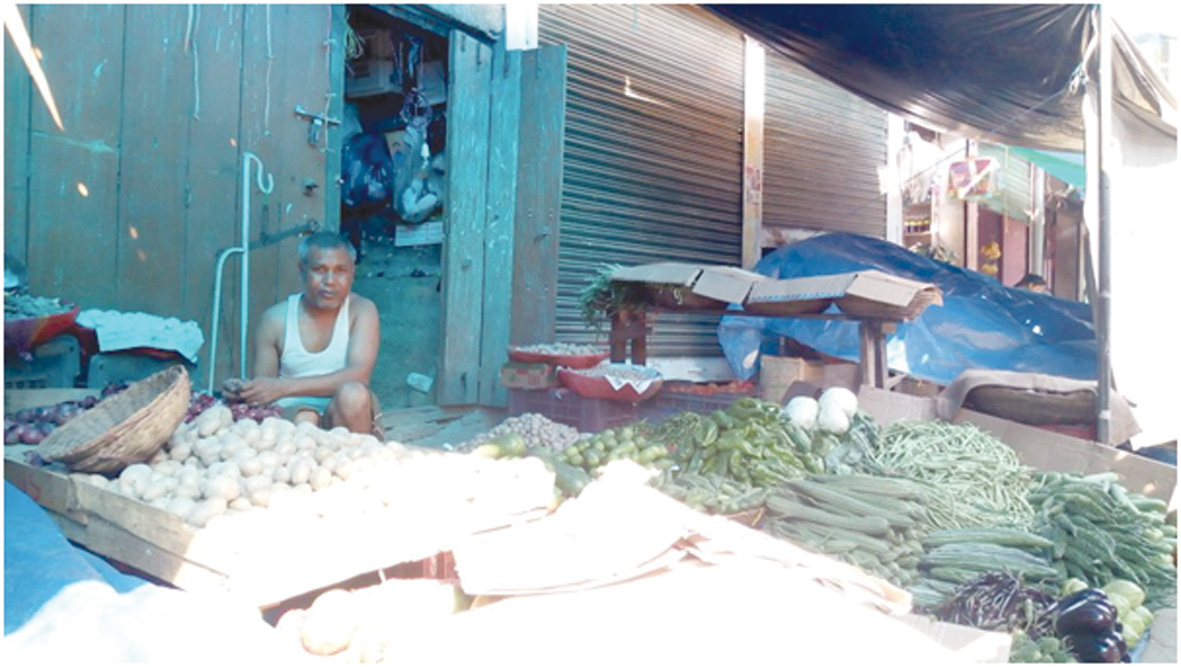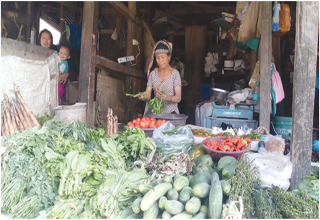[ Nang Sanie ]
At the crack of dawn, while most of us are turning off our alarms for “five more minutes” of sleep, groups of people of varying ages can be found bringing supplies and setting up shop for the day. Local vegetable sellers of Gandhi market of Itanagar can be found opening the shutters or covers of their store and putting fresh vegetables for display as early as 4 am.
Being a vegetable shop owner at small local areas is not easy; it is a necessity. Usually, those who end up as vegetable sellers have no choice; having no education and stricken with poverty, many resort to selling vegetables and end up doing so for a long time.
All people interviewed, ranging from people as young as 24 to over 70-year-old citizens, have been selling vegetables for as long as they can remember.

Once they start selling vegetables, they usually find themselves unable to commit to other businesses, jobs or education. Almost all sellers have their shops on rent or are looking after other people’s shops.
The struggles of selling vegetables begin from the collection of their stocks. Itanagar lacks farming and agriculture, thus, all vegetables sold in the market are usually imported from places like Ziro, Hollongi, Harmuti and sometimes even as far as Bomdila.
While most of the sellers collect it from suppliers who do mass import, few sellers like Vijay Roy (26) travel all the way to the places themselves to collect the vegetables. While sellers like Vijay can ensure high kitchen economy by picking their vegetables themselves, sellers like Narang Minu of the Chiram Chira (underground sub-market in Gandhi market), have to handpick from the stock made available by their suppliers, while even smaller shop owners like Takam Ajak have to resort to accept whatever stock they are given and throw the bad stock out, resulting in an inevitable loss.
Vegetables shops around the market are almost always in a close range but in the underground Chiram Chira market, stocks can range from the usual vegetables to bamboo shoot and silk worms (locally known as Tapun), which cannot be found in the usual supermarkets.
In the underground sub-market, women sit side by side in open shops. They admit that their closeness and trust among themselves is better than that of the other shops outside. They feel free to borrow stocks they lack and look after each other’s stores in one’s absence, claiming it makes their day easier and find entertainment at the lack of customers amongst each other’s company.
One among the other challenges as a vegetable seller in Gandhi market is the people they deal with on a daily basis. While some sellers like Rekha Pal (42), who has been running her shop for over 12 years, is lucky to state that most of her customers are nice and do not bargain much, some shop owners are not as lucky and have to deal with customers who bargain and argue about the prices without any mercy.
The shop owners at the most, have experience with customers who forcefully take vegetables at their desired price but not with theft. Some shop owners state that every month, cleaners from the municipality come to collect money from them, waving a paper and claiming that if they do not pay money, a complaint against them will be sent to the deputy commissioner. Although the amount may be as small as around Rs 50, small shop owners who somehow manage to sell only Rs 1000 worth of vegetables a day, at the most, feel as though they are being cheated because of their illiteracy and innocence and are not happy with parting from their hard-earned money.
Ajak, who has been running her shop since 2002 says all her time is spent in the shop that she has not even thought of other dreams or aspirations, she admits that she cannot even remember or guess her age as she has not looked into the mirror for a long time.
“As long as I can go to sleep with a full stomach, I am fin,” says Ajak.
Sitting at the same spot hours on end with little to no breaks is not easy, but that is the life of a vegetable seller with no other source of income at Gandhi market.




